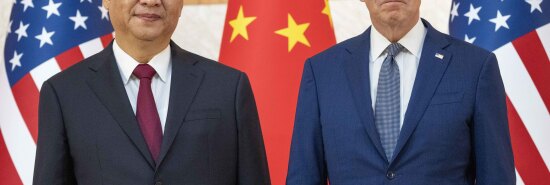
Biden’s talk with Xi was good; his tempting of fate is bad
Tom Rogan
President Joe Biden was right to talk with President Xi Jinping of China at the G-20 summit in Bali. Talking is better than war. If the two leaders’ conversations can mitigate the risk of conflict, that’s a good thing.
What is not a good thing, however, is Biden’s apparent tempting of fate with the idea that Xi seeks some kind of durable coexistence with the U.S.-led democratic international order. He does not. Xi’s sense of purpose and destiny drive him to challenge that order, not to suffer it.
Much of the optimism following the Bali meeting flows from the naive view of the center-left intelligentsia that climate change will be the defining geopolitical issue. The New York Times’s Somini Sengupta observes that “an open channel, focused on climate, is important for two reasons. It could go a long way toward reducing distrust. It could also give both sides a chance to learn what the other is doing to rein in emissions at home and what they’re doing to persuade other countries to do the same.” Celebrating the meeting, Le Monde assessed that “the urgency created by a deep crisis, climate change, also requires, as a quasi prerequisite, the cooperation of the two biggest polluters on the planet.” Professor Jessica Chen Weiss, a former Biden administration China hand, says it is “encouraging to see shared opposition to nuclear use or threats in Ukraine and common acknowledgment that the world expects the United States and China to do more to work together on global challenges, e.g. climate, debt, health, food insecurity.”
HOW WOULD A REPUBLICAN-CONTROLLED HOUSE AFFECT RELATIONS WITH CHINA?
But China has no genuine interest in the climate change issue. Rather, it deftly weaponizes this Western climate priority for its own ends. and Western diplomats and leaders are so naive as to allow themselves to be manipulated.
Beijing has learned that if it merely dangles the idea of carbon emission reductions, it can hope to leverage significant U.S. concessions in other areas that actually matter to China — U.S. trade and technology interests, Taiwan, and broader concerns over human rights. Beijing’s carbon emissions data are inherently unreliable. The true sign of China’s commitment to carbon reduction is its continued construction of hundreds of new coal power plants even now, in contravention of its existing promises. In falling for Xi’s climate seduction, we ignore the intersection of his deep duplicity and his broader ambition.
Take Chen Weiss’s analysis that “Xi also gave assurances that would do much to reduce U.S. concerns, if honored: ‘China has never sought to change the existing international order, does not interfere in the internal affairs of the United States, and has no intention to challenge or replace the United States.'”
It sounds great. But those assurances have no chance of being honored because they would fundamentally undermine Xi’s foreign policy strategy. Xi is actively seeking to replace the U.S.-led international order with a Beijing-led feudal mercantile order. He is not doing so because he wants to aggravate the U.S., but because that displacement is the fundamental ingredient of China’s global supremacy. In the same way, Xi’s espionage and political and cultural interference in U.S. internal affairs is not born of a transitory whim but rather from Xi’s need to extract what he can from the U.S. while limiting its means of resisting him.
This is not to say that the U.S. should shut down any room for compromise. Chen Weiss rightly observes, for example, that reduced U.S. military deployments within the Taiwan Strait would make sense alongside reciprocal action by the PLA. Those U.S. deployments do not, after all, measurably increase Taiwan’s actual means of resisting a Chinese attack. Again, however, the big-picture challenge remains. Chen Weiss wrongly suggests there are “many reasons” to believe that concerns Xi is expediting his timetable to attack Taiwan are “misguided.” She observes that “his address to the 20th Party Congress in October did not include accelerated targets for military modernization or more aggressive language against Taiwan independence.” Chen Weiss references John Culver’s excellent piece on what as yet unseen warning indicators we might see were Xi to decide to attack Taiwan. Yet those indicators pertain to terminal-stage developments. Indicators for midstage preparations of an attack — PLA force disposition, training, and Politburo Standing Committee ideology — all point to an invasion between 2023 and 2027. And the U.S. military isn’t ready for that.
It is a grievous error to take what Xi and his minions say at face value. Take the inaccurate claim by Deutsche Welle’s business editor that the two leaders “also condemned Russian President Vladimir Putin’s nuclear threats.” That is not so. In reality, Biden and Xi only expressed opposition to the use of nuclear weapons in the Ukraine conflict. At the same time, Chinese Foreign Minister Wang Yi had only praise for Moscow at a meeting with his Russian counterpart Sergey Lavrov on Tuesday. Wang described Moscow’s oscillating nuclear rhetoric as representing its “rational and responsible position.”
The West needs to get real about this. China is very much determined to replace the U.S.-led international order with one that is incompatible with the interests of free peoples everywhere. Compromise may be possible and preferential at the margins, but pretending the U.S. and China can forge a durable compromise is a very dangerous folly.
CLICK HERE TO READ MORE FROM THE WASHINGTON EXAMINER
